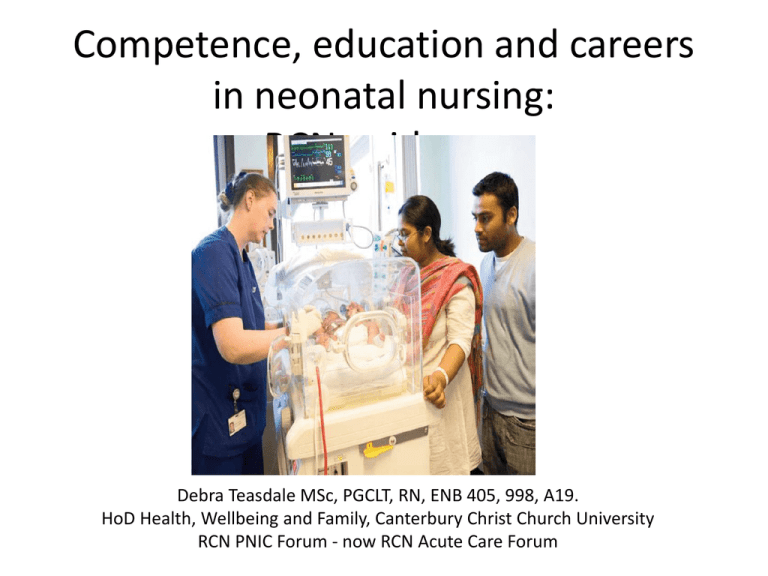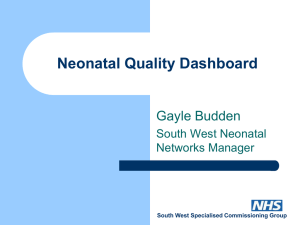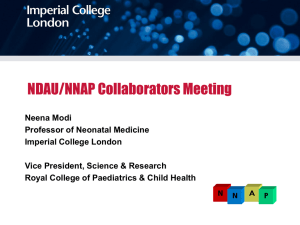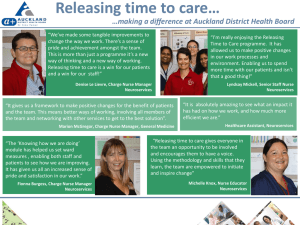Competence, education and careers in neonatal nursing
advertisement

Competence, education and careers in neonatal nursing: RCN guidance Debra Teasdale MSc, PGCLT, RN, ENB 405, 998, A19. HoD Health, Wellbeing and Family, Canterbury Christ Church University RCN PNIC Forum - now RCN Acute Care Forum 1. Career Development for Neonatal Nurses Must be equitable, transparent and transferable 5 key components; 1. Level of practice 2. Minimum professional / educational requirements 3. Competence level / broad description of role 4. Continuous professional development 5. Relationship to SfH Career framework (2006) ( NB this is not the same as the KSF banding ) Novice / New Entrant (Level 5 SfH) Minimum professional / educational entry requirements Registered Nurse (RN) (Child or Adult) Or Registered Midwife (RM). Diploma / degree qualification. Continuous Professional Development Competence level and broad description of level of practice/ role. Preceptorship programme for newly qualified staff Induction/Foundation education in neonatal care. To remain in role 1. Work toward degree qualification (if diplomate) 2. I year post qualification NMC Approved Mentorship Course. 3. Continuous updating to remain contemporary Achieves and maintains Competence and Core skills for new entrants. Initially - acquires basic skills and knowledge for practice for supervised practice in special care. Once practice level has reached consistently high standards this role may extend to high dependency care under supervision, prior to undertaking post registration qualification.. The novice neonatal nurse… • …may remain at this level, maintaining competence but should be encouraged and supported to develop further to prepare for the specialist course. • Or undertake post registration qualification in Neonatal nursing (special, high dependency and intensive care) to support development of Competence and Core Skill as neonatal nurse (QIS) status • And works towards Neonatal Nurse (QIS) Competence and Core Skills under direct supervision of NMC qualified mentor in high dependency and Intensive care environments……to become…. Competent QIS Nurse - SfH Level 6 Minimum professional / Continuous Professional educational entry Development requirements RN (Child/Adult) or RM To remain in role 1.Consolidates knowledge and skills Post registration development neonatal 2. Continuous updating to remain qualification contemporary. Engaged with degree 3. NMC approved Sign-off mentorship level study NMC mentor programme Competence level and broad description of level of practice/ role. Achieves and maintains Neonatal Nurse (QIS) Competence and Core Skills The neonatal nurse is qualified to within all areas of neonatal care. The Competent neonatal nurse may….. • The neonatal nurse may remain at this level, maintaining competence or may choose to develop further. • Undertake study in neonatal nursing at honours degree/postgraduate level to support development of competence and core skill at experienced neonatal nurse status and potential role development. • Works towards competence and core skills for experienced neonatal nurses under the supervision of an experienced nurse with sign-off mentor qualification. Proficient QIS nurse – SfH level 6/7 Minimum professional / educational entry requirements RN (Child/Adult) or RM Post registration neonatal qualification NMS Sign off mentor qualification Honours degree qualification or recognition of prior experiential learning in clinical, education, leadership or management roles. Continuous Professional Development Competence level and broad description of level of practice/ role. To remain in role 1.Consolidates knowledge and skills development 2. Continuous updating to remain contemporary. 3. NMC approved Practice educator/lecturer programme for those leading in-house / HE education Achieves and maintains Competence and Core Clinical skills for experienced neonatal nurses. Experienced neonatal nurses work in prescribed nursing roles such as Neonatal Transportation, Shift Management Roles (eg Ward Charge Nurse/Sister), Development care Lead, Lactation support, Community Outreach Practitioner, Practice Development/clinical educator The Proficient Neonatal Nurse may… • The neonatal nurse may remain at this level, maintaining competence or may choose to develop further. • Undertake postgraduate study to support future role development and the development of competence as an expert neonatal nurse. • For clinical practice role development works towards Core Skills for expert neonatal nurses (or locally determined equivalent) under supervision (expert nurse with an NMC approved sign-off mentor qualification or an appropriately qualified member of the medical team) Expert QIS nurse – SfH Level 7/8 Minimum professional Continuous / educational entry Professional requirements Development RN (Child/Adult) or RM To remain in role 1.Consolidates Post registration knowledge and neonatal qualification skills development 2. Continuous NMC Mentor /Practice updating to remain Educator qualification contemporary. Educated to Masters 3. Access to Doctoral and post level. Doctoral study to Recognition of prior advance neonatal experiential learning in nursing in the clinical, education, future. leadership or management roles Competence level and broad description of level of practice/ role. Achieves and maintains competence for expert neonatal nurses. For those in clinical practice expert roles, achieves and sustain core clinical skills set as specified within expert level or as locally determined. Expert neonatal nurse roles include Neonatal Unit Manager, Neonatal Practice Development, Facilitator/Researcher, established Advanced Neonatal Nurse Practitioner, Neonatal Nurse Consultant The ANNP role • All the problems with QIS recognition across the country are mirrored within the ANNP role • The guidance recognises that ANNP development is a journey and that roles are disparate • To address this it provides exemplar job outlines agreed by representatives across all 4 countries for trainee, ANNP, Senior ANNP 3. Competences: What has been determined? Each unit shall have a lead for; All staff will undertake training to; Breastfeeding Developmental needs and care of the baby Emotional and psychological support to families Safeguarding children Palliative care Bereavement support Education and training Support mothers to feed their infant appropriately promote the use of breast milk and breastfeeding Assess developmental needs Prepare babies and families for discharge, Support families in acquiring the knowledge and skills they will need to care for their baby at home provide emotional and psychological support to families Safeguarding children Supporting families during bereavement TOOLKIT FOR HIGH-QUALITY NEONATAL SERVICES (DH 2009) RCN Guidance; Competences for Neonatal Nursing Careers • Family centred and developmental care implicit • Competences embedded across career journey. • KSF (NHS, 2004) core dimensions. • Clear relationship to levels of practice with increasing complexity as careers progress • Where the primary remit is clinical, this includes demonstration of a core skill set • Communication and interpersonal relationships • Personal, professional and people development • Health, safety and security • Service development • Quality • Equality, diversity and rights • Responsibility for patient care (Core skill set) EG; Communication and Interpersonal relationships • Including data processing and management, production and communication of information and knowledge, and the design and production of visual records. • The neonatal nurse will use a wide range of media to communicate effectively with babies, parents, carers and health care workers. • The neonatal nurse will demonstrate interpersonal behaviour and skills conducive to developing and maintaining therapeutic and professional relationships. The elements of this are; • • • • • Communicate effectively with babies, families, relatives, carers and other professional colleagues. Act as the neonate’s advocate. Maintain effective and supportive communication within the neonatal nursing team and with other professionals. Contribute to creating an environment that fosters open communication and trust with families and colleagues. Liaise with health care professionals and individuals in other disciplines from within and outside the organisation to support quality patient care. New entrant (Novice) Neonatal nurse (QIS) [Competent ] Experienced neonatal nurse [Proficient] Expert neonatal nurse Understand the importance of effective communication. • Demonstrate the ability to communicate effectively and efficiently with colleagues. • Communicate tactfully, maintaining trust, integrity and confidence. Develop a rapport and communicate effectively within the neonatal team and with other health care. professionals, about routine and daily activities, overcoming differences that may exist. Process, modify and manage data and information. • Write complex reports. • Prepare and deliver presentations. • Establish and maintain communication with individuals and groups about complex and difficult neonatal matters, over coming problems. Influence strategic policy making at local and national level. • Lead meetings, give presentations and influence a wide range of individuals and groups at strategic level to take action and make changes. • Receive and process complex, sensitive and contentious information, initiating actions required. 3a) CORE SKILLS SET Core skills specifically relate to patient care (Responsibility for patient care). • Fluid, electrolyte, nutrition & elimination management • Neurological & pain management • Respiratory & cardiovascular management • Skin, hygiene & infection control management • Temperature management • Bereavement management • Investigations & procedures • Equipment New Entrant Competent QIS Proficient QIS Recognise normal behaviour in babies of different gestations, including sleep/ awake states. • Report deviations from normal. Recognise physiological and behavioural differences between stress, distress, discomfort, pain, convulsions and drug withdrawal. Provide anticipatory Initiate referrals guidance and based support for on need. staff to recognise physiological and behavioural differences. • Alleviate neonate’s discomfort, pain etc using standard nursing strategies Expert New Entrant Competent QIS Proficient QIS Expert Safely administer intravenous therapy according to unit guidelines, recognising and reporting deviations/ complications. Set up, maintain and discontinue intravenous/intraarterial therapy, according to unit guidelines. • Maintain central lines. • Intervene appropriately to reduce/avoid deviations/ complications. In specific situations, insert peripheral intravenous lines. • Supervise insertion of intravenous lines by others. • Manage appropriate treatment for deviations/complica tions • Establish intravenous and intra-arterial access. • Remove central lines. • Instigate and prescribe treatment. • Select and prescribe appropriate fluid management. • Devise, audit and review guidelines for best practice in partnership with medical staff. 4. Recommendations Four Areas for action • • • • Recruitment and retention Partnerships with educational providers Developing a relevant curriculum Continuing professional development RCN guidance - working in practice. Foundation Course ; • New entrant competences provides focus for in-house course in practice under supervision of mentor / practice educator QIS Staff new to the unit; • Competence grid can be used to assess capabilities and then create action plan where development needed, or provide clear rationale for accelerated career progress. Established staff; • Allows prior practical experience of staff to be acknowledged and education plan individualised • Supports network approach to maintaining currency of knowledge and skills (rotational posts) . Partnership with education providers Educational needs analysis • Use to inform and map workforce development and educational plans in practice Working with education partners; • ‘Competent’ level competences and skill set to determine practice outcomes for QIS courses in APT • Placements to support care level development • Influence child and midwifery pre-reg’ programmes so potential recruitment pool becomes wider (must have neonatal content and 4 week placement) Demonstrating FtP Developing robust performance management; • Use the Career grid to guide expected educational attainment/ development pathways • Use competence levels to determine the required FtP standard to be met to as part of appraisal and/or promotion process Commissioners • Using this as a benchmark in commissioning process for neonatal nursing care delivery • Should extend to educational commissioning also Thank you






